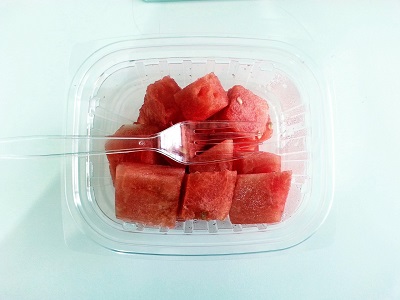 If you’re trying to find some of the reasons behind your weight gain struggles, you might not need to look any further than the plastic packaging you’re bringing home from the grocery store.
If you’re trying to find some of the reasons behind your weight gain struggles, you might not need to look any further than the plastic packaging you’re bringing home from the grocery store.
Plastics Touching Food Might Worsen Weight Gain Struggles
New research is showing that the hormone-disrupting chemicals in plastic might not stay separate from the food they come in contact with. Moreover, it could be a contributor to weight gain struggles that are already placing people at risk of weight gain struggles.
This is not to say that eliminating plastic packaging from what you eat will also simultaneously remove all weight gain struggles you’ve been facing. That said, if the research is correct, it could take away one factor that has been making things harder than they need to be.
What the Research Indicates
A 2022 study published by a research team at the Norwegian University of Science and Technology examined the chemical compounds in 34 types of common plastic packaging that come in direct contact with the foods we eat. This includes items such as juice bottles, disposable water bottles, yogurt cups, Styrofoam meat trays, plastic wrap covering produce and cheese, and candy packages.
The team also looked into commonly used kitchen items such as sponges and polyurethane placemats.
The team determined that there were about 55,000 chemicals in these items. Of them, 629 were identifiable, and of those, 11 were recognized metabolic disruptors such as bisphenols and phthalates. Those metabolic disruptors act in the body in a way that changes the ability to regulate bodyweight, among other health impacts.
This suggests that a large, regular amount of plastic packaging touching your food could potentially contribute to your weight gain struggles.
How Can Plastic Chemicals Worsen Weight Gain Struggles?
Research has shown that when metabolism disruptors in plastics were exposed to in vitro human cell cultures, processes associated with excess fat accumulation as is seen in obesity can be triggered.
Moreover, it appears that it doesn’t take a lot of plastic contact to leach unwanted chemicals from the packaging to the food.
In March 2023, McGill University scientists in Canada proved that bisphenol (BPS) found in food labels as small as produce stickers could transfer from the sticker to the food that people eat. Though it isn’t clear whether the chemicals from a produce sticker would be enough to contribute to weight gain struggles, most people consume foods that have had far more contact with plastics than one sticker, indicating that a cumulative effect is possible.
The extent of the impact on weight gain struggles has yet to be determined, but many people are choosing to shop at farmers’ markets when they can to help avoid plastic packaging. Using cotton produce and tote bags to contain and transport food, and choosing kitchen utensils and implements other than plastic can help to reduce any plastic contact added after purchase.
Leave A Comment
You must be logged in to post a comment.